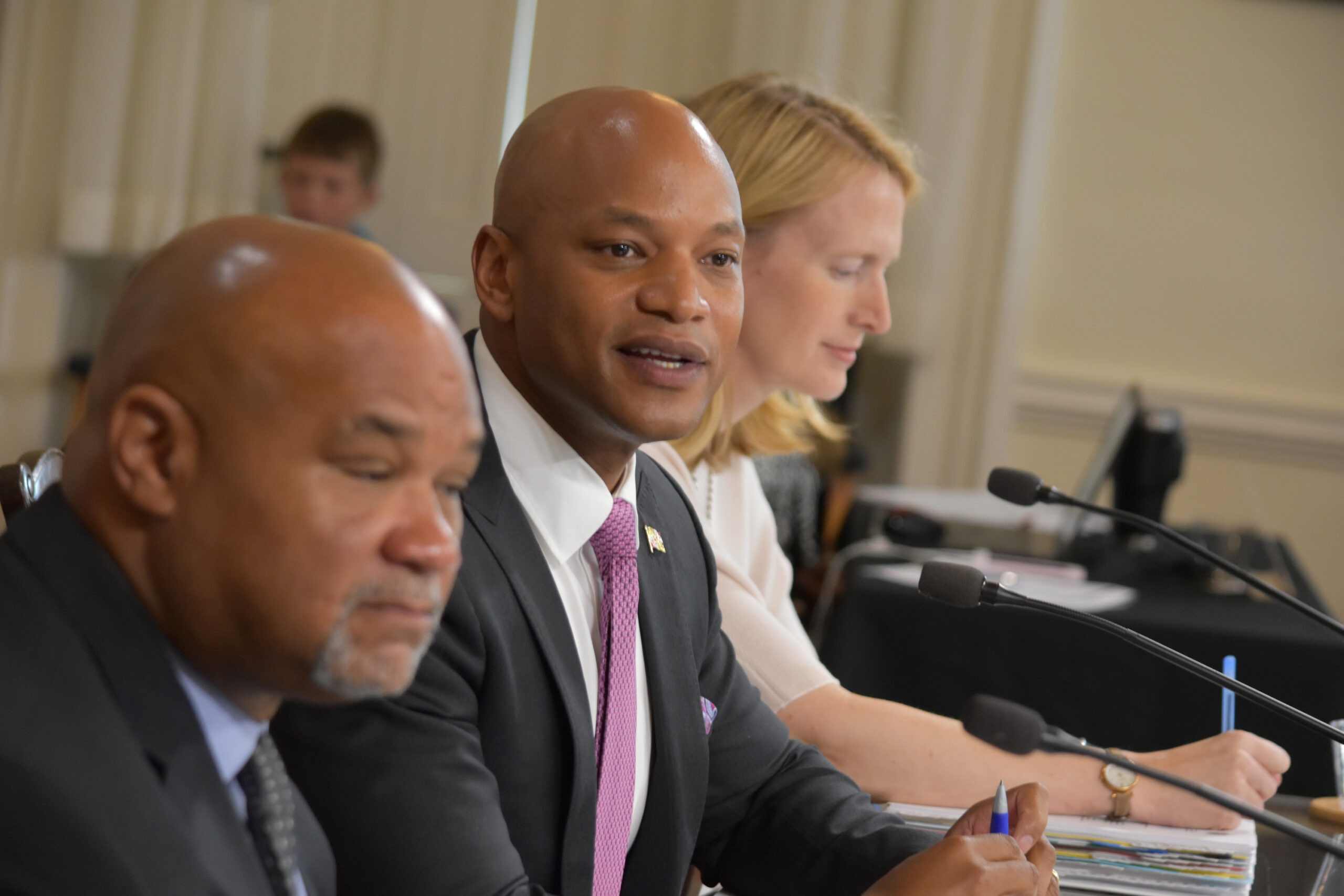Health department creates new jobs as Moore continues push to reduce vacancies

Maryland’s Health Department is adding more than 130 new state positions as the state continues to trim contractual positions and beef up the number of full-time government employees.
The positions approved Wednesday by the three-member Board of Public Works is the second such request made by the agency in three months. A year ago, Gov. Wes Moore (D) entered office vowing to make dramatic inroads in reducing what he said was 10,000 vacancies across state government in 12 months — a goal that has proven difficult to attain.
“This is priority work,” said Moore, who also publicly credited AFSCME, a union that represents 45,000 state, municipal and county workers.
“This is a core and an important frame that’s necessary when we talk about what does it mean to rebuild state government,” he said.
The legislature, in the 2023 session, cleared the way for the creation of new state positions. To do so, the governor must reduce contractual workers by 1.25 for every new position created.
In October, the board approved 144 new Department of Health positions. In doing so, the department eliminated 180 contractual jobs.
The board Wednesday unanimously approved 135 new state positions for the department. In doing so, the agency is eliminating 169 contractual positions.
Many of the positions will be within the Department of Disabilities Administration and Behavioral Health Administration. Roughly 70 contractual security positions at state hospitals and other facilities are also being converted.
The Department of Health, in documents provided to the board, said the conversions “helps to meet the Moore-Miller Administration’s objective of filling state government vacancies.”
Some lawmakers find such claims dubious.
In November, Sen. Clarence Lam (D-Howard and Anne Arundel Counties), said converting contractual positions will do little to reduce vacancies and improve services.
“While I think it’s now important to convert contractual workers to full time employees, I am hesitant to credit those conversions towards the hiring of new employees,” Lam said in November. “These contractual workers were already taking on essential jobs within state government — so transitioning them into traditional full-time employees is important, but it’s not actually building any more capacity within our state workforce and doesn’t result in a real-world net positive.”
Moore set a goal to “rebuild state government” and reduce the number of vacant positions. The governor said the vacancies hobble government services. Filling them would also benefit labor unions that represent employees across state government.
Last January, Moore vowed to fill 5,000 vacancies — half of the 10,000 open state positions he estimated existed — in his first year in office.
There are roughly 39,000 state employees across 64 executive branch agencies. That number excludes those employed in higher education and by the Maryland Department of Transportation.
The total number of vacancies, including in transportation, hovered between 6,100 and 6,300 to start the year.
Moore, on the campaign trail and in January, has frequently pegged that total number of vacancies at 10,000, including higher education. That number, however, is likely a rounding up of estimates of 9,400 to 9,600 given to the legislature.
Moore has fallen short of his goal.
Data provided to lawmakers in November by the Department of Budget and Management, and analyzed by Maryland Matters, put the total number of new state employees hired by September at 791. The Office of the Governor that month acknowledged hiring “893 new employees” through mid-September.
The data also showed that the state is losing employees through retirement and attrition almost as fast as it can hire new employees.
Separately on Wednesday, Moore announced the appointment of Dyana Forester as senior director of Labor Relations for the Moore-Miller administration. In her new role, Forester will represent the governor in labor relations activities within the executive branch.
A former president of the Metropolitan Washington Labor Council AFL-CIO, Forester will start in her role Jan. 10.
“Dyana has served on the front lines of the labor movement for decades. I am grateful that she has chosen to continue that work in our administration,” Moore said in a statement. “If we want to be Maryland Strong, we need to be Union Strong. Dyana recognizes that vision, and she will work with us to make it a reality. She is, hands-down, the right person for the job.”
Forester has also previously served as the director of political and community affairs for the United Food and Commercial Workers Union Local 400, led efforts to increase the minimum wage to $15 an hour, worked to expand paid sick days to private sector workers, and was a delegate to the 2016 Democratic National Convention.
Later Wednesday evening, Moore announced that his administration had reached tentative three-year labor agreements with the state’s four major civilian employee labor unions.
“I’m pleased to announce that the State of Maryland has reached tentative three-year labor agreements in partnership with Maryland’s four major civilian employee labor unions. Rebuilding state government and supporting our state employees is a top priority for the Moore-Miller Administration, and while the final contracts must be ratified by a full member vote by all four unions, these preliminary agreements are another critical step forward in that work,” Moore said in a statement.
The governor said the tentative agreements were reached before a Dec. 31 deadline, but no additional details were released Wednesday evening.
Wrongfully convicted man awarded nearly $300,000
Also on Wednesday, the Board of Public Works approved a settlement with Jerry Lee Jenkins, who was wrongfully incarcerated.
Jenkins was convicted in 1987 of rape and sexual assault in Charles County. After a series of post-conviction proceedings, Jenkins was offered and accepted an Alford Plea. The agreement included an immediate sentence modification with another that would happen in 2010 for good behavior.
He was released in 2010.
Three years later, newly discovered DNA evidence proved another individual committed the rape. A Charles County Circuit Court judge vacated Jenkins’ conviction and then Gov. Larry Hogan (R) granted him a full pardon.
Jenkins will receive nearly $203,000 in compensation for time wrongfully spent in prison related to those convictions. He will also receive more than $89,000 in housing benefits available through The Walter Lomax Act.
The 2021 law was named for a man who was wrongfully convicted of murder and spent nearly four decades in prison.
Jenkins’ attorneys will also receive nearly $41,000 in legal fees and expenses.
The board unanimously approved the settlement without discussion.
Editor’s Note: This story was updated to include a statement from Gov. Wes Moore (D) about employee labor negotiations.
Danielle E. Gaines contributed to this report.




 Creative Commons Attribution
Creative Commons Attribution